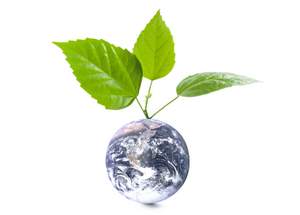|
Become VegetarianPlanetary Benefits Of A Vegetarian Diet
Become vegetarian and help save the planet. Many vegetarians choose not to eat meat for ethical and health reasons, but there is another important deterrent to eating meat - the environmental cost. One of the major benefits of a vegetarian diet is that it reduces the demand on the meat industry. Meat production methods cause severe damage to the environment and involve an unsustainable use of water and fossil fuel. If you can’t resist eating meat at least try to reduce your meat intake and eat only organic meat. 
Cost To The EnvironmentIn 2006, the United Nations Food and Agriculture Organization produced a report titled Livestock’s Long Shadow –Environmental Issues and Options. This report called for urgent action to remedy the hugely detrimental impact that meat production has on the environment. According to the FAO, the environmental consequences of meat production include land degradation, climate change, air and water pollution, water shortages, deforestation and loss of biodiversity. Measured as a percentage of human-related emissions, global meat production produces:
Water And Fossil Fuel UsageMore than 8% of global human water use goes towards meat production, mainly in the irrigation of feed crops. David Pimentel, a Professor of Insect Ecology and Agricultural Science at Cornell University in New York, has calculated the water and energy required to produce meat in comparison to other foods. Producing one kilo of beef requires 43,000 litres of water. As comparison, 1kg of potatoes requires 500 litres of water and 1kg of soybeans requires 2000 litres of water. Dr Pimental also analysed that beef production requires 40 kilocalories (kcal) of fossil fuel for every kcal of protein produced for human consumption. By comparison grain production requires an average 3.3 kcal of fossil fuel for every kcal of protein produced. Read this Australian Broadcasting Commision interview with Dr Pimental for some interesting insights to food sustainability. On the topic of the world food shortage Dr Pimental comments that, “I think we could feed the world population of 6.2-billion with the food that is being produced in the world, but then Australians and Americans would have to cut back on their meat, milk and egg consumption.” Become Vegetarian And Help Save The PlanetOne of the most effective ways to help the environment is to become vegetarian. Driving a hybrid car, using energy efficient light-bulbs and recycling your waste are excellent steps to take, but as individuals eating a vegetarian diet is the most effective way to reduce our carbon footprint. One Chicago University study found that changing to a vegetarian diet was more effective than driving a Prius. Kathy Freston, Health and Wellness Expert at the Huffington Post states it beautifully in this article,
Vegetarian is the New Prius
: Reduce Your Meat IntakeMany people have a habit of eating meat every day, which is not necessary given the wide variety of healthy foods available. Even if you'd never choose to become vegetarian, eating meat-free several days a week can help the planet too. The
Australian Better Health Initiative
defines the daily recommended serving of lean meat, fish, poultry, nuts and legumes to be 65-100gm cooked meat/chicken. This equates to ½ cup mince, 2 small chops or 2 slices roast meat. (This seems small compared to the actual serving size I usually see heaped on a meat-eaters plate!) If everyone who read this page replaced one meat-based meal each week with a vegetarian meal, they’d consume approximately 5.2 kg less meat annually. Per individual, that’s 223,600 litres of water and 208,000kcal of fossil fuel saved each year. If one person every day reads this page and decides to cut out a weekly serving of meat that’s a total of 1898kg less meat eaten annually. That would save 81,614,000 litres of water and 75,920,000 kcal of fossil fuel energy. That’s more than 32 Olympic swimming pools and over 9000 litres petrol.* Aren't you tempted to become vegetarian, at least for one day a week? "Pass up one hamburger, and you’ll save as much water as you save by taking 40 showers with a low-flow nozzle." - Ed Ayres, of the World Watch Institute. Vegetarian Protein SourcesIt is rare for people who have become vegetarian but still eat a varied diet to be short of protein, as long as they’re eating enough calories. Protein occurs in all living cells, so everything you eat is a protein source. The Nutrient Reference Values for Australia and New Zealand states that all of the necessary amino acids in protein can be provided in the amounts needed from plant sources. Most adults need between 0.75 grams (for women) and 0.84 grams (for men) of protein for every kilogram of body weight, with special dietary needs such as pregnancy or breastfeeding demanding a little more. There are many sources of vegetarian protein in foods that provide high protein alternatives to meat, such as soy products, hempseeds, spirulina, legumes, nuts, seeds, yeast, and freshwater algae. In the lean meat, fish, poultry, nuts and legumes category (one serving recommended daily) The Australian Better Health Initiative lists the following as being an equivalent to 65-100g cooked meat/chicken, or 80-120g in cooked fish fillet:
Eat Only Organic MeatEating organic meat is a much better health choice than eating meat contaminated by pesticides, drugs and growth hormones that have moved up the food chain from feed to beast. As well as being free from harmful toxins, organic meat has higher levels of omega 3 polyunsaturated fatty acids, beneficial minerals, essential amino acids and vitamins. Organic livestock farming methods promote health in both animals and the environment through lower stock levels, higher rotations, high animal welfare standards, healthy feeds and pastures and reduced stress to stock. If you're not willing or able to give up eating meat and become vegetarian at this time, eat less meat and buy it organic. Check out the advantages of being a flexitarian - that is, predominantly vegetarian but occasionally allowing meat in your diet for social or health reasons, or simply because sometimes you really crave meat. Best Vegetarian RecipesAs you consider a vegetarian lifestyle you might want to browse through some really excellent vegetarian recipes! This site has vegetarian lunch ideas and vegetarian dinner ideas and so much more. Check them out at Not-Just-Recipes.com. If you're looking for inspiration for a vegetarian main course, there are more great vegetarian recipes available at Everyday-Vegetarian-Recipes.com These are my favourite vegetarian recipe sites and trying all their recipes is keeping me busy and inspired! You'll be amazed at the delicious dishes you can create when you become vegetarian. As you investigate a healthy vegetarian diet you will probably come across several myths and stereotypes about vegetarians. As you can read in this article on Vegetarianism and Health , a balanced plant-based diet is a very healthy choice. References
Back to Healthy Eating Guide home from Become Vegetarian - Planetary Benefits Of A Vegetarian Diet
|
Are you as healthy as you can be?
Take action to lift your energy and vitality levels beyond recognition.
Focus on
building healthy eating habits for just one month with
Veg Up and you’ll enjoy the effects for years. You will amaze yourself when you see how much more you can achieve.
More Growing Raw
Newsletter
Be sure to subscribe to "More Growing Raw" newsletter to receive monthly healthy eating tips, Growing Raw news and updates.
Most Popular Articles
- Green Smoothie Health
- Raw Food Health Levels
- Growing Vegetables in Containers
- Healthy Eating Plans
- List of Healthy Food to Always Eat Organic
- Growing a Vegetable Garden in a Polytunnel
- All Natural Detox Diet
Does your body need a fresh start?
Brighten up with all natural detox routines that give your body a cleansing push towards healthier patterns.
Learn how to
detoxify your body naturally. Your body is smart enough to clean itself without expensive detox pills and potions.








